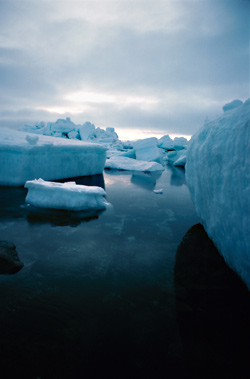Antarctica is supposed to be awe inspiring. And while working as a garbage man at McMurdo Station, a National Science Foundation (NSF) research outpost on Ross Island off the coast of Antarctica, former Seattleite and zine editor Nicholas Johnson was, in fact, struck by awe on a regular basis. But mostly he found the place funny. In Big Dead Place: Inside the Strange and Menacing World of Antarctica (Feral House, $16.95), he describes McMurdo as a frail human settlement on the edge of an infinite wasteland, “with all-you-can-eat desserts and an endless procession of theme parties . . . a town with disco clothes and high-power microscopes . . . a town where going outside requires authorization . . . where corpses have been stored in the food freezer and it is illegal to collect rocks.”
Johnson is a scholar of the absurdities of the place, obsessively poring over both the doublespeak in official staff memos and the extremely fucked-up history of Antarctic exploration. He places the mind-numbing officiousness of the NSF bureaucracy—which carefully screens all journalists and writers to secure favorable publicity—in a tradition of control freakishness and image management that goes back to Antarctic pioneer Adm. Richard Byrd, who engineered ticker tape parades for feats he never accomplished and demanded that his men sign oaths of loyalty to the Freemasons. Johnson is also a drunken social scientist, ruminating in the McMurdo smokers’ lounge on the dormitory decorations and sexual habits of his co-workers.
It’s not that Johnson is uninterested in nature. He actually has a gift for cliché-free descriptions like this: “The ice is so thick that even to consider it reminds you how scrawny and weak you are compared to the massive violent patience of the universe.” But it is fascination with the human-made that puts life in Big Dead Place. I recently wrote Johnson an e-mail to tell him that I appreciated his viewpoint because when I was in Valdez, Alaska, I found the parking lot of Eagle Foods more wondrous than any glacier. He replied, “Right. Nature really makes you focus on the generators heating your buildings, and that someone somewhere had to make a decision about what kinds of shower curtains to order. It’s hard to explain to people who’ve always lived in the city though.” In his book, he describes the human presence in Antarctica with an inspired offhandedness reminiscent of William Carlos Williams: “Each growling machine drags a fumbled leash of diesel exhaust.”
As a fan-letter-writing supporter of Big Dead Place, it pains me to admit that it’s rambling, overstuffed, and shapeless. But it’s inspired rambling, often rising to a Pynchonesque peak of vivid comic description. There were times reading this book when I disturbed my fellow Metro riders with uncontrolled sobs of laughter. Besides, tidy little writerly conclusions are overrated.
Case in point: Gretchen Legler’s On the Ice: An Intimate Portrait of Life at McMurdo Station, Antarctica (Milkweed Editions, $15.95). She’s a University of Maine professor who went to McMurdo Station courtesy of an officially sanctioned NSF writers grant. As she explains the gig, “the writer’s job, my job, would be to bring back visions.” She is exactly the type of writer—spouting profundities about the vastness of nature from the moment she steps off the plane—that Johnson loves to ridicule. Johnson devotes most of one chapter to taking apart the various visiting writers who do little besides parrot the standard pieties about nature’s grandeur. Johnson actually ridicules Legler by name, singling out her description of a pair of seals “curled around each other like a yin-yang symbol, that ancient Chinese symbol of balance.”
On the Ice has yin-yang out the yin-yang. Chapters titles like “The Sky, the Earth, the Sea, the Soul” are brimming with uplifting generalizations about the human spirit. “Perhaps the continent contributes to creating a sense of openness,” she writes, “a feeling of vulnerability, a sense that one is so insignificant in the big scheme of things that love then becomes more important rather than less; one sees, as Thoreau wrote, ‘our own limits transgressed,’ and so one goes toward the unknowable center, where the heart is.”
Right. The unknowable center. You know, where the heart is. It doesn’t matter if this stuff actually means anything, it has the rounded-off cadences of one of those tasteful little audio essays on All Things Considered. But as Johnson observes while hacking garbage out of the ice, “shit has a rich history in Antarctica.”








